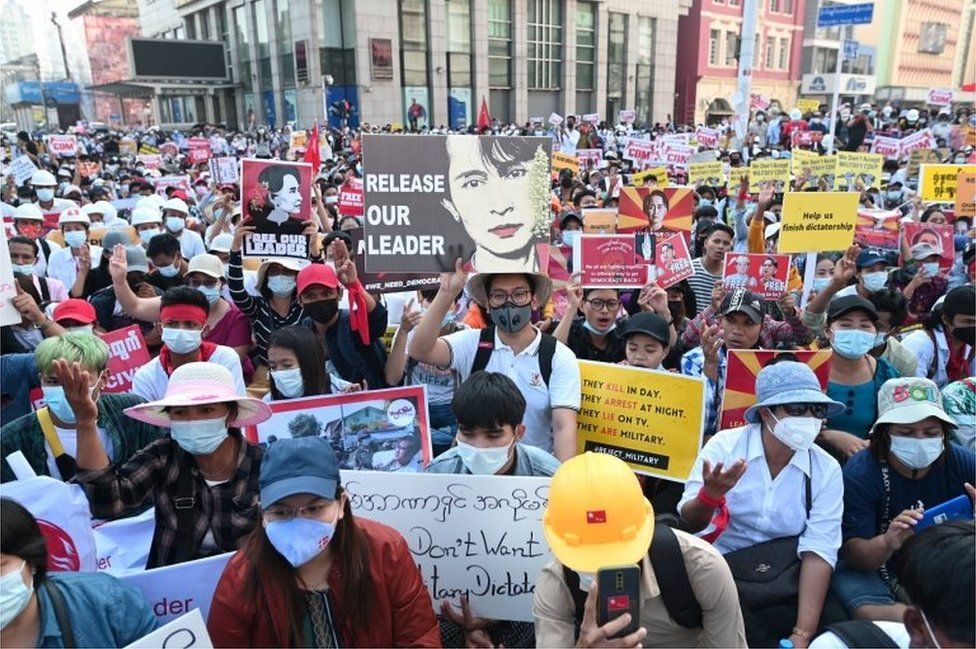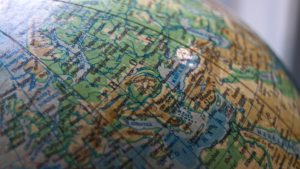
The coup d’état in Burma put a halt to 10 years of democratic experiment, and the generals resumed their rule. The military has always had a strong position in that country, and in recent decades it has managed to establish its own “economic empire”. The coup was meant to protect it from dismantling; it was also a consequence of personal political ambitions of military leaders. Most likely, the military dictatorship will persist for years at the expense of brutal crackdown on protesters, and restrictions imposed on the opposition. The external pressure will be cautious, because no country wants to directly intervene in this conflict. The role of international community, including that of Europe and the USA, is limited to declarations and punitive sanctions. China, on the other hand, may play a more active role.
The military coup in Burma took place on February 1, 2021 – just before the first session of the newly elected parliament. The National League for Democracy (NLD), headed by Aung San Su Kyi – winner of the 1991 Nobel Peace Prize, won a landslide in November 8, 2020 elections. Her NLD won 396 out of 480 seats in parliament, while the party supported by the military (USDP) – only 30. The army thus suffered a political defeat despite a quarter of seats reserved for it under the 2008 constitution. Ethnic minorities also achieved a poor result – 47 seats.[1]
The election results changed the plans of the influential Burmese army chief, General Min Aung Hlaing. In July 2021, after turning 65, he was to retire from the military and start a political career, trying to reach the presidency. Not only did the decisive victory of the NLD thwart those calculations, it could also mean holding him accountable for the persecution of the Rohingya Muslim community in 2017, which resulted in the exodus of nearly a million people to neighboring Bangladesh. However, the main factor behind the coup was the generals’ fears that the increasing strength and continued popularity of the NLD could put a cap on military influence, especially its economic power.
Burma: Owned by the military
The origins of the economic empire of the Burmese military ( which is known in Myanmar as „Tatmadaw”) date back to the 1960s and the experiment with the Burmese socialism. In 1989, on the wave of elimination of foreign influence, the army changed the official name of the country to Myanmar [2]. The economic power of the military grew out of the privatization of the 1990s. Two large, military concerns were then created: Myanmar Economic Holdings Limited (MEHL) and Myanmar Economic Corporation (MEC), dominating the local economy and most of its lucrative sectors. They became a basis of the military’s income and a tool for maintaining the loyalty of its cadres.[3]
The economic power of Tatmadaw is one of the main causes of difficulties in the political transformation in Burma. The military establishment has always feared that if Burma would switch from a military dictatorship to a genuine democratic system, Tatmadaw would lose its economic position, dividends and extensive influence. As an institution, military controls the ministries of defense, home affairs and the border ministry. It is completely independent of the state structures, and the constitution imposed by the military in 2008 takes it out of any civilian control. Additionally, the quarter of seats reserved for it in both houses of parliament is intended to enable the army to block any attempts to amend this constitution.
Failed transformation
Burma’s gradual transformation towards democracy began in 2010 with the release of Aung San Suu Kyi from house arrest where she spent 15 years. In 2015, her party won the parliamentary elections, which allowed the opposition to enter the government and take control of its civilian part.[4] However, the constitution written by the generals prevented the Nobel Prize winner from taking over the presidency, because it excludes candidates whose spouses or children have foreign citizenship (her sons are British citizens). As a result, her close associate Win Myint, a former speaker of the House of Representatives of the Burmese Parliament, became president. Suu Kyi herself assumed the position of the State Counsellor created for her (comparable to the position of the prime minister) and the function of the minister of foreign affairs.
Aung San Suu Kyi’s position on the country’s political and social map is unique. It is not only the face of the opposition, but above all the daughter of General Aung San, “father of the Nation”. He was the commander of the Burmese National Army, which freed the country from Japanese occupation, negotiated with the British the conditions for gaining independence, and became interim prime minister. In July 1947, he was assasinated, and he did not see his country’s independence (January 4, 1948). In 1960, his wife and daughter left the country, first to India and then to Great Britain. In Burma, the military took over the government in 1962. Aung San Suu Kyi studied political science at Oxford and learned there the Western culture. When she returned to the country after 28 years, she was immediately drawn into the whirlwind of political events. The party she founded – NLD – won the elections in 1990, but the military annuled the results and placed her under house arrest.
For the West, Aung San Suu Kyi has become a symbol of steadfastness, and the face of the struggle of the Burmese people against the regime. She has lost that image in recent years due to accusations the she remained silent over the persecution of the Muslim Rohingyas.[5] The atrocities were planned and carried out by the military, but those actions were supported by the majority of citizens, and the League leader – a devoted Buddhist – did not protest. Moreover, as the minister of foreign affairs, she was trying to explain the military’s actions and even agreed to personally represent Burma – in practice to defend the generals – before the International Court of Justice in The Hague in late 2019/1920 against the allegations of “genocide” in the case filed by the government of the Gambia.[6]
Abroad her reputation had been tarnished, she nevertheless strengthened her popularity at home by defending its country’s image, and explaining the motives of the Buddhist majority. At the same time, her party strengthened efforts to amend the constitution which would reduce the number of military deputies and enable the transition to an authentic, full democracy.[7] The November 2020 elections – won by NLD by an even larger margin than in 2015 – brought a prospect of a faster democratization, but a military coup, justified with an alleged ballot-box fraud, stopped the planned reforms. [8]
The Sarong Revolution
After the coup, General Min Aung Hlaing became the dictator – and formally – the head of the newly established State Administration Council. He has full legislative, executive and judicial power. Aung San Suu Kyi – like her close associates and hundreds of NLD’s MPs – was detained. She was first accused of possessing unlicensed walkie-talkies and breaching the restrictions on the coronavirus, then – charged with corruption. The charges were designed to have her convicted and prevent her political activity.[9] The military has introduced a state of emergency in parts of Burma and cut off internet access, anticipating mass protests in the country. Since February 1, hundreds of thousands of people have taken to the streets, engaged in civil disobedience and strikes. Similarly to the protests in the past (1988, 2007), this time they were met with a brutal reaction by the authorities.
An original symbol of opposition to the coup have become sarongs, traditional skirts known in Burma as htamein, and the resistance against the regime began to be called the “sarong revolution”. The leading role in this form of protests is played by women who hang their skirts and underwear over the streets of Burmese cities. This is a big problem for the police and the army, because, according to local superstitions, if a man passes beneath a htamein, it weakens him; he loses his masculinity. [10] For Burmese women, the fight for democracy, personified by Aung San Suu Kyi’s very many years of struggle, stands also for a fight for equality: Burma ranks 114 out of 153 analyzed countries in the Global Gender Gap Index 2020 of the World Economic Forum (WEF). [11]
Reaction of the International Community
The West has unequivocally condemned the coup in Burma. Criticism and calls for a halt to violence came from Washington and Brussels also after the brutal pacifications of the protests.[12] The statement of the G7 foreign ministers on February 23, 2021 sounded in the same vein.[13] USA and the European Union imposed sanctions on 11 individuals linked to the coup, including general Min Aung Hlaing, and the companies that are Tatmadaw’s economic basis. It seems, however, that this is not enough to persuade the Tatmadaw to make concessions.
A bloc that could make a difference is ASEAN (Association of Southeast Asian Countries) of which Burma is a member. However, the guiding principle of this organization is non-interference in the internal affairs of others, so it is difficult to expect joint actions against the regime. The more so because most of the 10 member – countries of that bloc do not have a democratic system (Vietnam, Laos, Cambodia, Brunei, Thailand) or suffer from serious limitations (Malaysia, Singapore). Thailand which is Burma’s neighbor, had itself seen a military coup a few years ago (May 2014) and is ruled by the military. Of the ASEAN countries, Singapore has come up with the most severe criticism of the coup in Burma. On the other hand, a special session of ASEAN convened because of the situation in Burma on the initiative of Indonesia and Malaysia (March 2, 2021), ended only with an appeal for reconciliation, dialogue and a peaceful resolution of the conflict. However, Indonesia’s Foreign Minister Retno Marsudi called on the Burmese military to restore democracy.[14]
China is a factor limiting international reactions to the coup in Burma. Western governments and their Asian allies (including Japan and India) fear that too much pressure on the regime may destabilize it and strengthen the ties between generals and Beijing.[15] The more so as the military establishment has maintained pragmatic relations with its powerful northern neighbor for a long time.[16] China is Burma’s leading trading partner and supplier of military equipment. Visiting the Burmese capital in January 2020, Xi Jinping stated that his country “shares its destiny with Burma.”
Good relations with the government presided by Aung San Suu Kyi resulted in an increasing presence of the Chinese in the economic life of Burma, which is why the coup did not suit them. On March 11, China decided to sign a UN Security Council statement that strongly condemned the use of violence against peaceful demonstrators. [17] At the same time, however, Beijing is striving to stabilize the situation in that country, and to calm anti-Chinese sentiments that have begun to emerge. Therefore, China could play a role of a pragmatic mediator between the military and the opposition. They acted similarly (and successfully) in South Sudan, where their serious investment interests were also at stake.[18]
[1] https://researchbriefings.files.parliament.uk/documents/CBP-9127/CBP-9127.pdf
[2] W Polsce dopiero w 2012 roku Komisja Standaryzacji Nazw Geograficznych ustanowiła, że krótką nazwą będzie Mjanma, ale dopuszcza również wariant Birma. Urząd Publikacji Unii Europejskiej zaleca zaś stosowanie w tekstach unijnych nazwy krótkiej podwójnej – Burma/Myanmar.
[3] https://www.ohchr.org/EN/HRBodies/HRC/MyanmarFFM/Pages/EconomicInterestsMyanmarMilitary.aspx
[4] https://www.crisisgroup.org/asia/south-east-asia/myanmar/myanmar-elections-results-and-implications
[5] Special Report: Fading Icon – What happened to Aung San Suu Kyi? https://www.reuters.com/article/us-myanmar-suukyi-history-special-report-idUSKBN1OI1ET
[6] Aung San Suu Kyi at the International Court of Justice https://www.swp-berlin.org/10.18449/2019C51/
[7] Suu Kyi: Myanmar constitution must change for ‘complete democracy’ https://asia.nikkei.com/Editor-s-Picks/Interview/Suu-Kyi-Myanmar-constitution-must-change-for-complete-democracy
[8] Explainer: Crisis in Myanmar after army alleges election fraud https://www.reuters.com/article/us-myanmar-politics-explainer-idUSKBN2A113H
[9] Aung San Suu Kyi to face new corruption charges, regime says on state TV https://www.frontiermyanmar.net/en/aung-san-suu-kyi-to-face-new-corruption-charges-regime-says-on-state-tv/
[10] With ‘Sarong Revolution’, women in Myanmar defy coup and patriarchy https://www.reuters.com/article/us-myanmar-politics-women-idUSKBN2B31TB
[11] Global Gender Gap Report 2020 | World Economic Forum https://www.weforum.org/reports/gender-gap-2020-report-100-years-pay-equality
[12] https://eeas.europa.eu/headquarters/headquarters-homepage/93923/myanmar-statement-high-representative-josep-borrell-latest-repression-military_en
[13] https://eeas.europa.eu/headquarters/headquarters-homepage/93626/myanmar-statement-g7-foreign-ministers_en
[14] https://jakartaglobe.id/news/the-safety-of-myanmar-people-is-top-priority-indonesia
[15] https://www.straitstimes.com/asia/se-asia/japan-says-considering-response-to-myanmars-military-coup
[16] Myanmar Coup: A Battleground for Sino-Japanese Influence https://www.tokyoreview.net/2021/03/myanmar-coup-a-battleground-for-sino-japanese-influence/
[17] U.N. Security Council agrees to condemn Myanmar violence, urge military restraint https://www.reuters.com/article/us-myanmar-politics-un-idUSKBN2B22D8
[18] Strategy of ‘Parallels’: China in the South Sudanese armed conflict; Obert Hodzi Note d’actualité n°14/16 de l’Observatoire de la Chine, cycle 2016-2017 Janvier 2017
[evc_interactive_banner type=”classic” custom_link=”url:https%3A%2F%2Fmastersandrobots.tech%2F|||”]




